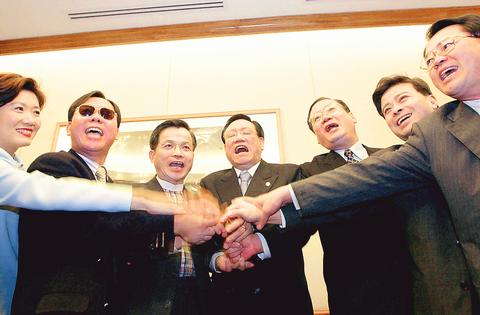The KMT began a push to recall President Chen Shui-bian (
The party's legislative caucus approved a proposal by Legislator Ting Shou-chung (
It did not, however, get the immediate backing of the People First Party (PFP), which prefers to initiate a motion of no confidence against the premier in the legislature.

PHOTO: GEORGE TSORNG, TAIPEI TIMES
The KMT decision came in the wake of a meeting between the caucus representatives of the three opposition parties in an attempt to form an alliance and coordinate their attack on the government.
The meeting reached a consensus on several smaller matters such as changing the agenda of today's legislative session from interpellation of the premier to a review session on the government budget, breaking off communications with the legislative caucus of the DPP and making Premier Chang Chun-hsiung (
The meeting was attended by PFP Legislator Diane Lee (
A statement, which was read by Tseng after the meeting, said that Chang had ridiculed the authority of the legislature by abruptly declaring a halt to the construction of the power plant, without consulting lawmakers.
In accordance with another agreement, Legislative Yuan Speaker Wang Jin-pyng (王金平) did not attend a meeting with the heads of the five branches of government held by the president last night.
At today's legislative session, as well as discussing the review of the 2001 budget, lawmakers are also expected to propose a number of measures aimed at increasing the legislature's authority over the executive branch, including the Law Governing Legislators' Exercise of Power, amendments to the Presidential and Vice Presidential Election and Recall Law (總統副總統選舉罷免法) and the new Budget Law.
The three parties' agreement on less important measures did not help them resolve the central issue preventing concerted action against the Chen-Chang administration, the question of recalling the president or proposing a vote of no confidence in the premier.
The KMT is loath to support a no-confidence motion because if it passes, the president is likely to use his constitutional power to dissolve the legislature and call fresh elections -- in which the KMT is likely to do poorly, to the benefit of the PFP.
In proposing the recall of the president yesterday, Ting said that the re-election of legislators wouldn't help end the current political fiasco, adding that recalling the president was the only solution, otherwise a new legislature would still have to face a dominant president.
The PFP's Lee, on the other hand, said to recall the president would create more social disruption and spoke strongly in favor of the no-confidence vote.
* Vote of no confidence:
- Requires a motion signed by one-third of Legislative Yuan members, and passage needs support from a simple majority.
- If the no-confidence vote passes, the president must nominate a new premier, who then forms a new cabinet, but the president can also dissolve the lawmaking body and call elections.
* Recall of a president:
- Requires a motion from one-fourth of legislators and needs support from two-thirds for passage.
- If the dismissal is approved by lawmakers, a popular referendum is held.
- If over half of the voters approve the dismissal, new elections are held.
Source: Reuters

The CIA has a message for Chinese government officials worried about their place in Chinese President Xi Jinping’s (習近平) government: Come work with us. The agency released two Mandarin-language videos on social media on Thursday inviting disgruntled officials to contact the CIA. The recruitment videos posted on YouTube and X racked up more than 5 million views combined in their first day. The outreach comes as CIA Director John Ratcliffe has vowed to boost the agency’s use of intelligence from human sources and its focus on China, which has recently targeted US officials with its own espionage operations. The videos are “aimed at

STEADFAST FRIEND: The bills encourage increased Taiwan-US engagement and address China’s distortion of UN Resolution 2758 to isolate Taiwan internationally The Presidential Office yesterday thanked the US House of Representatives for unanimously passing two Taiwan-related bills highlighting its solid support for Taiwan’s democracy and global participation, and for deepening bilateral relations. One of the bills, the Taiwan Assurance Implementation Act, requires the US Department of State to periodically review its guidelines for engagement with Taiwan, and report to the US Congress on the guidelines and plans to lift self-imposed limitations on US-Taiwan engagement. The other bill is the Taiwan International Solidarity Act, which clarifies that UN Resolution 2758 does not address the issue of the representation of Taiwan or its people in

US Indo-Pacific Commander Admiral Samuel Paparo on Friday expressed concern over the rate at which China is diversifying its military exercises, the Financial Times (FT) reported on Saturday. “The rates of change on the depth and breadth of their exercises is the one non-linear effect that I’ve seen in the last year that wakes me up at night or keeps me up at night,” Paparo was quoted by FT as saying while attending the annual Sedona Forum at the McCain Institute in Arizona. Paparo also expressed concern over the speed with which China was expanding its military. While the US

SHIFT: Taiwan’s better-than-expected first-quarter GDP and signs of weakness in the US have driven global capital back to emerging markets, the central bank head said The central bank yesterday blamed market speculation for the steep rise in the local currency, and urged exporters and financial institutions to stay calm and stop panic sell-offs to avoid hurting their own profitability. The nation’s top monetary policymaker said that it would step in, if necessary, to maintain order and stability in the foreign exchange market. The remarks came as the NT dollar yesterday closed up NT$0.919 to NT$30.145 against the US dollar in Taipei trading, after rising as high as NT$29.59 in intraday trading. The local currency has surged 5.85 percent against the greenback over the past two sessions, central